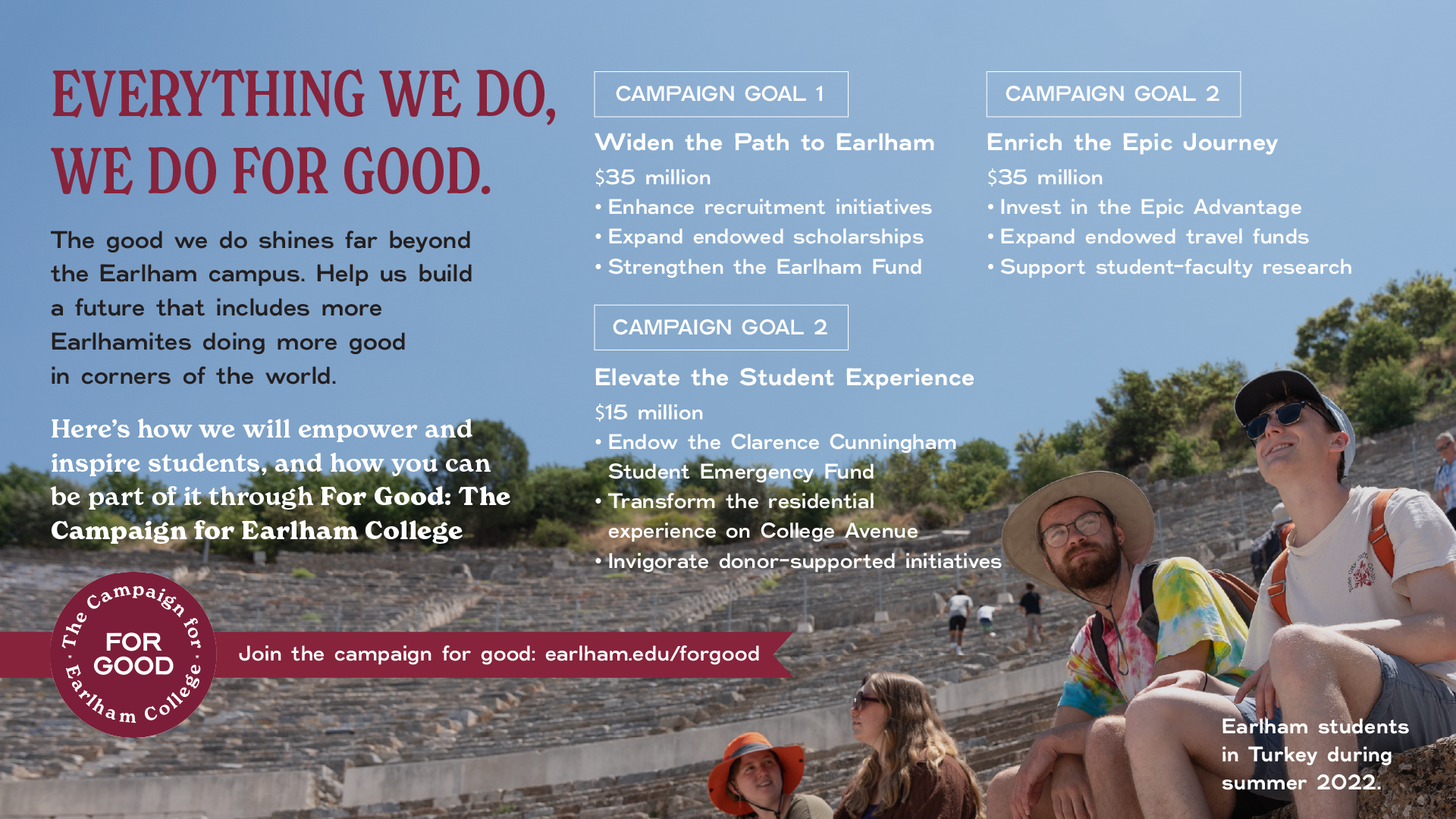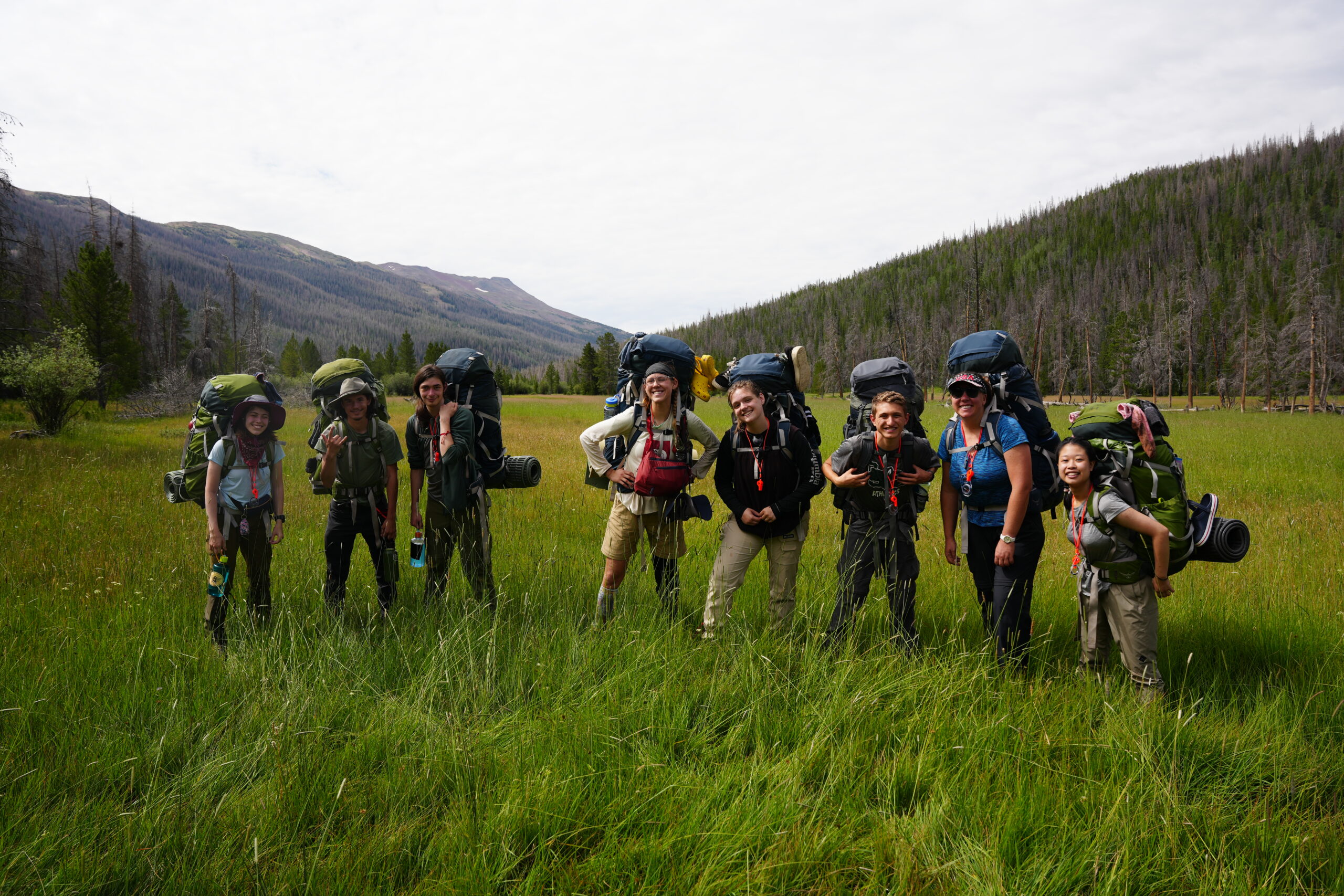
Life beyond the indoor halls of Earlham offers students and community members the chance to grow, connect and learn life skills that only close contact with nature can provide.
Much of college life can often center around activities and knowledge that take place indoors inside of classrooms, labs, gyms and libraries. At Earlham, the landscape and its bounties also serve as a classroom and a reminder of a value system that embraces community, accessibility, wellness and sustainability. Earlham has a rich history and many resources that support student exploration of all the ways environment is integral to a well-rounded college experience. What students learn in the barns, gardens, farmlands, hiking systems and beyond are lessons they take with them when they become citizens in the world after graduation.
“What I do know of Earlham is that there’s always been a deep respect for where we live,” said Rick Stephens, interim provost at the college. “Stewardship is a huge component of who we are. For students, [regardless of the] area of study they may be in, be it health sciences, business, education or others, a piece of the value system we hope they learn is stewardship of the earth.”
The following is a survey of the outdoor life Earlham students and others in the community enjoy, learn from and—indeed grow from.
Center for Environmental Leadership
Earlham’s Center for Environmental Leadership (CEL) helps students explore the connections between social and environmental systems. Whether through academic study or hands-on pro- grams, students work on the problems within these systems to develop solutions that are both creative and just. Individual courses and projects also offer opportunities to enjoy nature, connect with peers and learn new skills.
Programs housed under the CEL include Earlham’s Outdoor Education program, Miller Farm, Student Sustainability Corps, additional sustainability initiatives and academic programs. The Student Sustainability Corps takes the lead on a number of projects including collecting compost, running a free thrift store on campus, overseeing the repair room and the Heart Market (where students and faculty sell their wares), and planting initiatives on back campus.
Miller Farm
Miller Farm participants focus on sustainable agriculture. The farm, which is student-run as much as possible, provides opportunities to learn about sustainable farming, do hands-on work and sell and share crops with others.
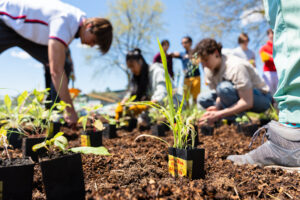
“There’s power in growing, but also power in experiential learning and the liberal arts education,” said Tony Noble, the now former farm manager who served Earlham for six years before resigning this summer. “Almost any aspect of life you can find here at the farm: business, marketing, science, biology, geology, communication, math, construction, soil science, animals, spirituality. It’s a great place to connect.”
Miller Farm is a hub of knowledge and education, a place where people can learn, teach and then teach others to teach. It’s some of the most practical education that Earlham offers. Students can work at the farm and in the greenhouse, learn how to engage with the community at the farmer’s market and gain both hands-on practical skills and life skills. In addition to the garden beds on the property, including dedicated space for community gardens, areas for growing, gathering, cooking and working are also available.
Earlham Nature Reserve System
The Earlham Nature Reserve System (ENRS) is an initiative uniting multiple properties and more than 400 acres of land managed for diversity, sustainability, research, teaching and recreation in the Wayne County area.
The natural areas that comprise the ENRS—the College’s back campus, Sedgwick’s Rock Preserve, Wildman Woods, Iverson Woods, Reller’s Woods and the Test Study Area—include ponds, creeks, rivers, prairies, forests and recreational trails for hiking and biological study, showcas- ing some of Richmond’s interesting topography.
The goal for the ENRS is to make the properties more accessible to the public.
“In Indiana, a lot of large pieces of land are privately owned,” said Jalen Sleet ’18, the property manager. “That creates a barrier to people having access to simple things like shade or green space, which really make a difference to quality of life.”
Sleet, who teaches the Trail Building and Invasive Species Removal course at Earlham, is enthusiastic about hosting events to encourage those in the community to get outside and explore these lands.
“There’s a lot to be learned, even if it’s not related to your major,” said Sleet. “Standing next to 250-year-old trees or seeing dozens of spring ephemerals blooming at the same time can be a therapeutic and educational experience for anyone.”
Outdoor Education
Since 1971, Earlham has been at the forefront of training outdoor leaders and educators. Earlham’s approach com- bines on-campus courses, field experiences and leadership practice for developing both technical and interpersonal skills—all of which encourage exploring the outdoors in a principled way.
The core principles and attitudes promoted by Earlham’s Outdoor Ed include the adventuresome spirit, sense of place, servant leadership, the contemplative spirit and simplicity.
Kimberly Reid ’07, director of outdoor education, sees a number of ways that students are positively impacted by the program. “It’s a safe place to challenge yourself, to grow and to stretch your comfort zone,” she said. The skills that students learn in the Outdoor Ed program at Earlham underscore leadership, community engagement, hands-on outdoor preparedness and more, and can be transferred to any field students pursue.
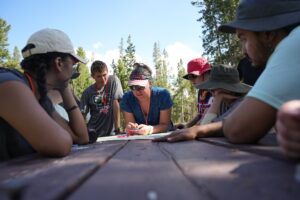
Those involved in the Outdoor Ed program run the campus rock climbing wall and the bike share, oversee the gear room (where students can check out outdoor equipment), support the student-run outdoor club and Outdoor Ed House, and offer many activities and even academic courses throughout the year. Of all of the programs, activities and experiences offered through Outdoor Ed, the August Wilderness program may be the best known. “It’s one of the oldest and most well-respected programs in the country,” said Mads Chomentowski ’20, who oversaw the program while Reid led Earlham’s New Zealand trip during the spring semester of 2023.
During August Wilderness, a group of incoming students, led by faculty and student leaders, backpack the Uinta Mountains in Utah for 11 days. Group permits for hiking the Uintas are limited these days, said Chomentowski. But the Earlham group has retroactive status. “It’s a cool legacy,” Chomentowski added. “We just celebrated our 50th anniversary.”
Equestrian
As the only student-run barn and collegiate horse program in the U.S. (with support from faculty advisers and horse professionals), Earlham’s equestrian program provides opportunities for leadership and community not available at any other college or university.
The operations of the Suzanne Hoerner Jackson Equestrian Center, a 25-stall barn and indoor riding space, are managed by a student barn staff. As a member of the Earlham College Stables Cooperative, students care for school horses in exchange for the riding privileges free of cost, which makes horseback riding accessible to many who have not been able to experience it before.
Approximately 30 students were involved in the co-op during the 2022-23 academic year, gaining experience in community leadership. The shared responsibility brings its own rewards.
“It’s about developing that ability to communicate and lead,” said faculty advisor Emmett Smith. “That makes people learn more about themselves, develop and grow as people and become more able to interact with humans around them. It spills into the rest of your life.”
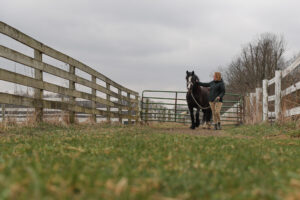
While some students arrive with considerable experience as riders, faculty advisor Thea Clarkberg ’22 emphasizes that Earlham’s equestrian program welcomes all levels. Students can take lessons, give lessons, take on management roles and minor in equestrian management. Convenience is another benefit of the equestrian program. Participants can take advantage of the campus trail system for riding without ever having to leave campus.
“The fact that our barn is on campus is extremely rare, and the fact that it’s right next to the trails means we don’t have to trailer horses anywhere,” said Smith. “That’s another part of the accessibility issue—it’s an advantageous part of our program.”
Story written by Jensen Pennock ’16 ESR ’22.
